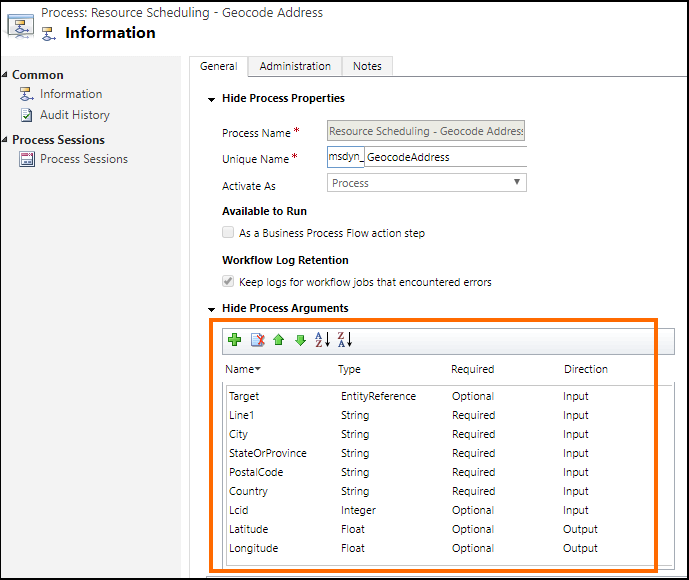カスタム プラグインを作成して優先する地理空間のデータ プロバイダーを使用する
この記事では、Universal Resource Scheduling の 2 つの地理空間の操作、2 つの地理空間の操作のカスタム プラグインの作成方法についての情報が提供され、地理空間データ用の Google Maps API を使用する際のサンプル カスタム プラグインの例を示します。
地理空間の操作の入力および出力パラメーター
カスタム プラグインを作成する際には、プラグイン コードに渡されるデータおよび予想出力データを確認できるように地理空間の操作の入力および出力パラメータを検討する必要があります。
2 つの地理空間の操作の入力および出力パラメーターを表示できる 2 つの方法があります。
- Web API の操作の参照内容: Universal Resource Scheduling の地理空間の操作に関する参照情報を表示します。
Microsoft.Dynamics.CRM.msdyn_RetrieveDistanceMatrix
- 操作定義: パラメーターが必須、または任意かどうかの情報を含む、入力/出力パラメーターについての情報に関する Dynamics 365 の操作定義を表示できます。
Note
この記事/表で紹介した Web API の種類と操作は、あなたの環境でも利用可能であり、ご利用の環境のサービス ドキュメントや Postman を使って調べることができます。 詳しくは、Web API サービス ドキュメント と Microsoft Dataverse Web API と Postman を使用する を参照してください。
操作定義を表示するには、設定>プロセスを選択します。 次に、操作名:リソース スケジュール - ジオコード住所または リソース スケジュール - 距離マトリクスの取得を検索してからグリッドの操作を選択してその定義を表示します。 たとえば、ここには、わかりやすく表示される領域が入力および出力パラメーターに関する情報を提供するリソース スケジュール - ジオコード住所(msdyn_GeocodeAddress) 操作の定義があります。

カスタム プラグインを記述する
プラグインは、IPlugin インターフェイスを実装したカスタム クラスです。 プラグインの作成の詳細については、プラグインの開発 を参照してください
カスタム プラグインのサンプルは、既定の Bing マップ API の代わりにフィールド操作に地理空間のデータを提供する Google Maps API の使用方法を提供する参照のために提供されます。 詳細: サンプル: 地理空間のデータ プロバイダーとして Google Maps API を使用するカスタム プラグイン。
各サンプル プラグインの以下のコードは Google API のデータを使用しています。
msdyn_GeocodeAddress.cs プラグイン ファイルの ExecuteGeocodeAddress メソッド
public void ExecuteGeocodeAddress(IPluginExecutionContext pluginExecutionContext, IOrganizationService organizationService, ITracingService tracingService)
{
//Contains 5 fields (string) for individual parts of an address
ParameterCollection InputParameters = pluginExecutionContext.InputParameters;
// Contains 2 fields (double) for resultant geolocation
ParameterCollection OutputParameters = pluginExecutionContext.OutputParameters;
//Contains 1 field (int) for status of previous and this plugin
ParameterCollection SharedVariables = pluginExecutionContext.SharedVariables;
tracingService.Trace("ExecuteGeocodeAddress started. InputParameters = {0}, OutputParameters = {1}", InputParameters.Count().ToString(), OutputParameters.Count().ToString());
try
{
// If a plugin earlier in the pipeline has already geocoded successfully, quit
if ((double)OutputParameters[LatitudeKey] != 0d || (double)OutputParameters[LongitudeKey] != 0d) return;
// Get user Lcid if request did not include it
int Lcid = (int)InputParameters[LcidKey];
string _address = string.Empty;
if (Lcid == 0)
{
var userSettingsQuery = new QueryExpression("usersettings");
userSettingsQuery.ColumnSet.AddColumns("uilanguageid", "systemuserid");
userSettingsQuery.Criteria.AddCondition("systemuserid", ConditionOperator.Equal, pluginExecutionContext.InitiatingUserId);
var userSettings = organizationService.RetrieveMultiple(userSettingsQuery);
if (userSettings.Entities.Count > 0)
Lcid = (int)userSettings.Entities[0]["uilanguageid"];
}
// Arrange the address components in a single comma-separated string, according to LCID
_address = GisUtility.FormatInternationalAddress(Lcid,
(string)InputParameters[Address1Key],
(string)InputParameters[PostalCodeKey],
(string)InputParameters[CityKey],
(string)InputParameters[StateKey],
(string)InputParameters[CountryKey]);
// Make Geocoding call to Google API
WebClient client = new WebClient();
var url = $"https://{GoogleConstants.GoogleApiServer}{GoogleConstants.GoogleGeocodePath}/json?address={_address}&key={GoogleConstants.GoogleApiKey}";
tracingService.Trace($"Calling {url}\n");
string response = client.DownloadString(url); // Post ...
tracingService.Trace("Parsing response ...\n");
DataContractJsonSerializer jsonSerializer = new DataContractJsonSerializer(typeof(GeocodeResponse)); // Deserialize response json
object objResponse = jsonSerializer.ReadObject(new MemoryStream(Encoding.UTF8.GetBytes(response))); // Get response as an object
GeocodeResponse geocodeResponse = objResponse as GeocodeResponse; // Unbox into our data contracted class for response
tracingService.Trace("Response Status = " + geocodeResponse.Status + "\n");
if (geocodeResponse.Status != "OK")
throw new ApplicationException($"Server {GoogleConstants.GoogleApiServer} application error (Status {geocodeResponse.Status}).");
tracingService.Trace("Checking geocodeResponse.Result...\n");
if (geocodeResponse.Results != null)
{
if (geocodeResponse.Results.Count() == 1)
{
tracingService.Trace("Checking geocodeResponse.Result.Geometry.Location...\n");
if (geocodeResponse.Results.First()?.Geometry?.Location != null)
{
tracingService.Trace("Setting Latitude, Longitude in OutputParameters...\n");
// update output parameters
OutputParameters[LatitudeKey] = geocodeResponse.Results.First().Geometry.Location.Lat;
OutputParameters[LongitudeKey] = geocodeResponse.Results.First().Geometry.Location.Lng;
}
else throw new ApplicationException($"Server {GoogleConstants.GoogleApiServer} application error (missing Results[0].Geometry.Location)");
}
else throw new ApplicationException($"Server {GoogleConstants.GoogleApiServer} application error (more than 1 result returned)");
}
else throw new ApplicationException($"Server {GoogleConstants.GoogleApiServer} application error (missing Results)");
}
catch (Exception ex)
{
// Signal to subsequent plugins in this message pipeline that geocoding failed here.
OutputParameters[LatitudeKey] = 0d;
OutputParameters[LongitudeKey] = 0d;
//TODO: You may need to decide which caught exceptions will rethrow and which ones will simply signal geocoding did not complete.
throw new InvalidPluginExecutionException(string.Format("Geocoding failed at {0} with exception -- {1}: {2}"
, GoogleConstants.GoogleApiServer, ex.GetType().ToString(), ex.Message), ex);
}
}
msdyn_RetrieveDistanceMatrix.cs プラグイン ファイルの ExecuteDistanceMatrix メソッド
public void ExecuteDistanceMatrix(IPluginExecutionContext pluginExecutionContext, IOrganizationService organizationService, ITracingService tracingService)
{
//Contains 2 fields (EntityCollection) for sources and targets
ParameterCollection InputParameters = pluginExecutionContext.InputParameters;
// Contains 1 field (EntityCollection) for results
ParameterCollection OutputParameters = pluginExecutionContext.OutputParameters;
//Contains 1 field (int) for status of previous and this plugin
ParameterCollection SharedVariables = pluginExecutionContext.SharedVariables;
tracingService.Trace("ExecuteDistanceMatrix started. InputParameters = {0},OutputParameters = {1}", InputParameters.Count().ToString(), OutputParameters.Count().ToString());
try
{
// If a plugin earlier in the pipeline has already retrieved a distance matrix successfully, quit
if (OutputParameters[MatrixKey] != null)
if (((EntityCollection)OutputParameters[MatrixKey]).Entities != null)
if (((EntityCollection)OutputParameters[MatrixKey]).Entities.Count > 0) return;
// Make Distance Matrix call to Google API
WebClient client = new WebClient();
var url = String.Format($"https://{GoogleConstants.GoogleApiServer}{GoogleConstants.GoogleDistanceMatrixPath}/json"
+ "?units=imperial"
+ $"&origins={string.Join("|", ((EntityCollection)InputParameters[SourcesKey]).Entities.Select(e => e.GetAttributeValue<double?>("latitude") + "," + e.GetAttributeValue<double?>("longitude")))}"
+ $"&destinations={string.Join("|", ((EntityCollection)InputParameters[TargetsKey]).Entities.Select(e => e.GetAttributeValue<double?>("latitude") + "," + e.GetAttributeValue<double?>("longitude")))}"
+ $"&key={GoogleConstants.GoogleApiKey}");
tracingService.Trace($"Calling {url}\n");
string response = client.DownloadString(url); // Post ...
tracingService.Trace("Parsing response ...\n");
DataContractJsonSerializer jsonSerializer = new DataContractJsonSerializer(typeof(DistanceMatrixResponse)); // Deserialize response json
object objResponse = jsonSerializer.ReadObject(new MemoryStream(Encoding.UTF8.GetBytes(response))); // Get response as an object
DistanceMatrixResponse distancematrixResponse = objResponse as DistanceMatrixResponse; // Unbox as our data contracted class for response
tracingService.Trace("Response Status = " + distancematrixResponse.Status + "\n");
if (distancematrixResponse.Status != "OK")
throw new ApplicationException($"Server {GoogleConstants.GoogleApiServer} application error (Status={distancematrixResponse.Status}). {distancematrixResponse.ErrorMessage}");
tracingService.Trace("Checking distancematrixResponse.Results...\n");
if (distancematrixResponse.Rows != null)
{
tracingService.Trace("Parsing distancematrixResponse.Results.Elements...\n");
// build and update output parameter
var result = new EntityCollection();
result.Entities.AddRange(distancematrixResponse.Rows.Select(r => ToEntity(r.Columns.Select(c => ToEntity(c.Status, c.Duration, c.Distance)).ToArray())));
OutputParameters[MatrixKey] = result;
}
else throw new ApplicationException($"Server {GoogleConstants.GoogleApiServer} application error (missing Rows)");
}
catch (Exception ex)
{
// Signal to subsequent plugins in this message pipeline that retrieval of distance matrix failed here.
OutputParameters[MatrixKey] = null;
//TODO: You may need to decide which caught exceptions will rethrow and which ones will simply signal geocoding did not complete.
throw new InvalidPluginExecutionException(string.Format("Geocoding failed at {0} with exception -- {1}: {2}"
, GoogleConstants.GoogleApiServer, ex.GetType().ToString(), ex.Message), ex);
}
// For debugging purposes, throw an exception to see the details of the parameters
CreateExceptionWithDetails("Debugging...", InputParameters, OutputParameters, SharedVariables);
}
カスタム プラグイン コードの作成後、プロジェクトをビルドしてプラグイン アセンブリ (.dll) を生成し、それは Universal Resource Scheduling の地理空間の操作のプラグインの登録に使用されます。